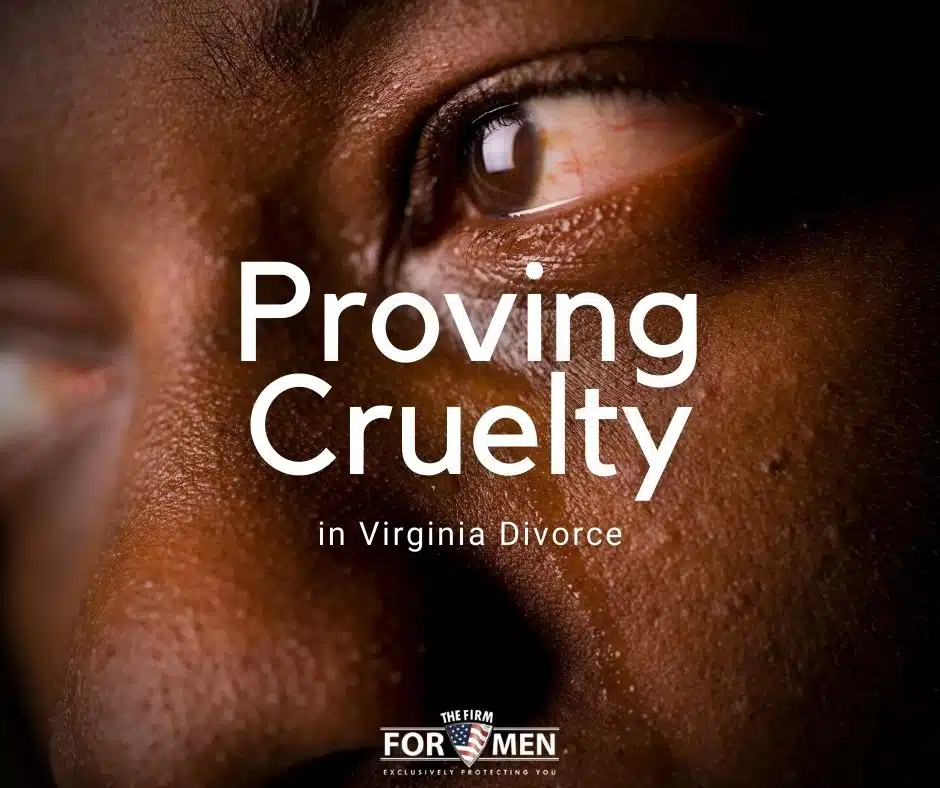Virginia resident Derek Malevich epitomizes vicousness in a relationship, capping a self-described habit of treating his girlfriend with “particular cruelty” by murdering her. Fortunately for the Commonwealth, Malevich lived in Virginia, Minnesota, not our state. Cruelty need not be so extreme to be proven in a divorce case in the Old Dominion.
Jump to a Section
- Divorce for Cruelty in Virginia
- Proving Cruelty in Virginia
- Keep Yourself Safe
- Psychological Evaluation Recommendations
Divorce for Cruelty in Virginia
Under Code of Virginia § 20-91, the third of four fault grounds for divorce is spelled out like this:
Where either party has been guilty of cruelty, caused reasonable apprehension of bodily hurt, or willfully deserted or abandoned the other, such divorce may be decreed to the innocent party after a period of one year from the date of such act
“Cruelty” (to a person, not an animal) is generally understood in Virginia law to fall under two categories:
- Physical harm—Any behavior or choice that could conclude with physical harm to another person; anything endangering your health or safety is physical cruelty, which can include but is not limited to life-threatening acts, choices, or behaviors
- Emotional (mental) harm—Emotional cruelty encompasses a far broader range of behaviors, including verbal abuse, repeated neglect, violent or aggressive displays or acts (not necessarily directed at the complainant), consistent or proven infidelity, and unpredictable behaviors that result in emotional and mental cruelty
Qualitative and quantitative measures of any behavior help law enforcement and the courts determine cruelty:
- Duration—A brief, loud argument in your backyard will not constitute cruelty; a two-hour harangue in front of neighbors, friends, or relatives will probably pique a judge’s interest
- Repetition—One display of drunken ax-throwing in the garage could be overlooked; her daily, nightly, or weekly verbal threats to kick you in Big Jim and the Twins is cruelty
- Degree—An open-palm, single slap to the face once in a decade of marriage will not yield a strong case; bruising, broken bones, emergency room records, or damaged possessions will be an attorney’s dream
Proving Cruelty in Virginia
Proving cruelty in divorce is difficult, so approach the topic with your eyes open and your full faith in your attorney. Expect to be asked for physical evidence:
- Medical records—You have a right to your own medical records and these images, physicians’ reports, lab results, second opinions, and transcriptions can be presented in court
- Affidavits from mental health professionals—Your counselor, psychiatrist, psychologist, licensed clinical social worker, therapist, or religious advisor can provide written attestation of acts of cruelty by your spouse
- Statements—Your attorney can produce written statements from family members, neighbors, friends, and coworkers describing cruelty and its effect on you mentally, emotionally, and physically
- Photographs and videotape—Pictures of your own bruises, scratches, and contusions; pictures or videos of destroyed furniture, damage to your home’s interior; be sure to include police body cameras if intervention by law enforcement was needed
- Written communications—Texts, emails, and handwritten notes that refer to episodes of spousal cruelty, admissions of guilt, or threats can all be used
- Legal documents—Police reports, Protective Orders, court rulings, and judgments against your spouse can all be admissible
Keep Yourself Safe
Some Virginia men may feel they deliberately need to put themselves in harm’s way to collect evidence of cruelty. No legal professional will ever recommend this.
Do not risk your mental or physical health by “baiting” your spouse into yet another act of cruelty. Instead, memorialize (in a diary, online, by texts or emails to yourself, emails to your attorney, with photographs) any issues or conflicts that arise from her own predilection to cruelty. Always attempt to retreat, deflect, or evade your spouse’s abusive behavior, but you also have every legal right to contact law enforcement for every episode in which you feel unsafe or assaulted.
Remember that cruelty includes mental, physical, and emotional abuse. Consider asking your attorney to file for a protective order for temporary relief from the cruelty.
Under no circumstances should you escalate or do anything more than defend yourself. Even incidental contact can leave your handprint on your spouse’s arms, face, or body and be used as evidence against you.
Psychological Evaluation Recommendations
Unfortunately, the stigma of cruelty and abuse in a Virginia marriage may make you hesitant to press your case. Your attorney, for example, may recommend you submit to a psychiatric (or psychological) evaluation. This is not intended to humiliate you; the psychiatrist’s or psychologist’s report can bolster your case, demonstrating the effect your spouse’s treatment has on you.
Your attorney can also request the court to direct your spouse to submit to a similar evaluation. You may worry that your spouse can somehow fool the evaluator; this is seldom the case, as experienced mental health professionals know to overlook artificial behaviors and zero in on unconscious word choices, gestures, and body language.
You and your attorney need to think deeply about the relative value of subjecting minor children to a similar evaluation, though the court—or the children’s guardian ad litem—may demand such an interview.
Contact us today at The Firm For Men to connect with seasoned, compassionate family law attorneys. You may also telephone our offices at (757) 383-9184. You can be assured your privacy, safety, and concerns will all be respected. And that could be a refreshing change from your day-to-day home life right now.

